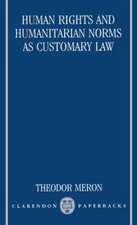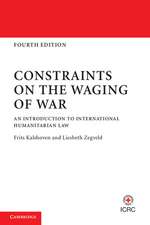Legitimate Targets?: Social Construction, International Law and US Bombing: Cambridge Studies in International Relations, cartea 133
Autor Janina Dillen Limba Engleză Paperback – 12 noi 2014
| Toate formatele și edițiile | Preț | Express |
|---|---|---|
| Paperback (1) | 255.09 lei 43-57 zile | |
| Cambridge University Press – 12 noi 2014 | 255.09 lei 43-57 zile | |
| Hardback (1) | 644.39 lei 43-57 zile | |
| Cambridge University Press – 12 noi 2014 | 644.39 lei 43-57 zile |
Din seria Cambridge Studies in International Relations
-
 Preț: 200.85 lei
Preț: 200.85 lei -
 Preț: 232.37 lei
Preț: 232.37 lei -
 Preț: 237.58 lei
Preț: 237.58 lei -
 Preț: 198.89 lei
Preț: 198.89 lei -
 Preț: 210.69 lei
Preț: 210.69 lei -
 Preț: 190.01 lei
Preț: 190.01 lei -
 Preț: 200.78 lei
Preț: 200.78 lei - 8%
 Preț: 401.23 lei
Preț: 401.23 lei -
 Preț: 229.56 lei
Preț: 229.56 lei -
 Preț: 265.70 lei
Preț: 265.70 lei -
 Preț: 200.08 lei
Preț: 200.08 lei -
 Preț: 207.81 lei
Preț: 207.81 lei -
 Preț: 158.77 lei
Preț: 158.77 lei -
 Preț: 162.49 lei
Preț: 162.49 lei -
 Preț: 231.47 lei
Preț: 231.47 lei - 11%
 Preț: 584.77 lei
Preț: 584.77 lei -
 Preț: 241.77 lei
Preț: 241.77 lei -
 Preț: 287.87 lei
Preț: 287.87 lei -
 Preț: 209.12 lei
Preț: 209.12 lei -
 Preț: 299.22 lei
Preț: 299.22 lei -
 Preț: 286.13 lei
Preț: 286.13 lei -
 Preț: 287.87 lei
Preț: 287.87 lei - 11%
 Preț: 641.67 lei
Preț: 641.67 lei - 11%
 Preț: 585.78 lei
Preț: 585.78 lei - 14%
 Preț: 843.23 lei
Preț: 843.23 lei -
 Preț: 303.80 lei
Preț: 303.80 lei -
 Preț: 284.78 lei
Preț: 284.78 lei -
 Preț: 279.76 lei
Preț: 279.76 lei -
 Preț: 285.75 lei
Preț: 285.75 lei -
 Preț: 324.24 lei
Preț: 324.24 lei -
 Preț: 290.16 lei
Preț: 290.16 lei -
 Preț: 291.69 lei
Preț: 291.69 lei -
 Preț: 392.52 lei
Preț: 392.52 lei -
 Preț: 315.99 lei
Preț: 315.99 lei
Preț: 255.09 lei
Nou
Puncte Express: 383
Preț estimativ în valută:
48.81€ • 51.10$ • 40.39£
48.81€ • 51.10$ • 40.39£
Carte tipărită la comandă
Livrare economică 07-21 aprilie
Preluare comenzi: 021 569.72.76
Specificații
ISBN-13: 9781107694866
ISBN-10: 1107694868
Pagini: 385
Dimensiuni: 151 x 227 x 20 mm
Greutate: 0.54 kg
Editura: Cambridge University Press
Colecția Cambridge University Press
Seria Cambridge Studies in International Relations
Locul publicării:New York, United States
ISBN-10: 1107694868
Pagini: 385
Dimensiuni: 151 x 227 x 20 mm
Greutate: 0.54 kg
Editura: Cambridge University Press
Colecția Cambridge University Press
Seria Cambridge Studies in International Relations
Locul publicării:New York, United States
Cuprins
Introduction; Part I. A Constructivist Theory of International Law: 1. The challenge; 2. The theory; Part II. The Definition of a Legitimate Target of Attack in International Law: 3. Positive law; 4. Customary law; Part III. An Empirical Study of International Law in War: 5. The rise of international law in US air warfare; 6. The changing logic of US air warfare; 7. The behavioural relevance of international law in US air warfare; Part IV. An Evaluation of International Law in War: 8. The lack of normative success of international law in US air warfare; 9. The impossibility of normative success for international law in war; Conclusion.
Recenzii
'Why do states obey international law? How and why do the laws of war constrain state behavior? Legitimate Targets explores the tensions, dilemmas, and power of international humanitarian law to shape the practice of war. This tour de force - rooted in insightful readings of military doctrine, international law, the practice of war, and dozens of interviews with military professionals - is a brilliant synthesis that will enable students of war to understand how and why the nature of war is changing.' Neta C. Crawford, Boston University, author of Accountability for Killing: Moral Responsibility for Collateral Damage in America's Post-9/11 Wars
''Can war be effectively regulated by international law?' In answering this vital question, Janina Dill offers a new and sophisticated understanding of the very nature of law and the way it creates effects in the world. Law is a compromise between utility and morality, between military pragmatism and humanitarianism, but it is also dynamic. It evolves through use and application to new challenges of war-fighting. Dill's excellent book will challenge long-held views about both law and how wars are fought.' Martha Finnemore, George Washington University
''Can war be effectively regulated by international law?' In answering this vital question, Janina Dill offers a new and sophisticated understanding of the very nature of law and the way it creates effects in the world. Law is a compromise between utility and morality, between military pragmatism and humanitarianism, but it is also dynamic. It evolves through use and application to new challenges of war-fighting. Dill's excellent book will challenge long-held views about both law and how wars are fought.' Martha Finnemore, George Washington University
Notă biografică
Descriere
Can international law regulate warfare? Experiences of US bombing suggests it does not solve the twenty-first-century belligerent's legitimacy dilemma.













